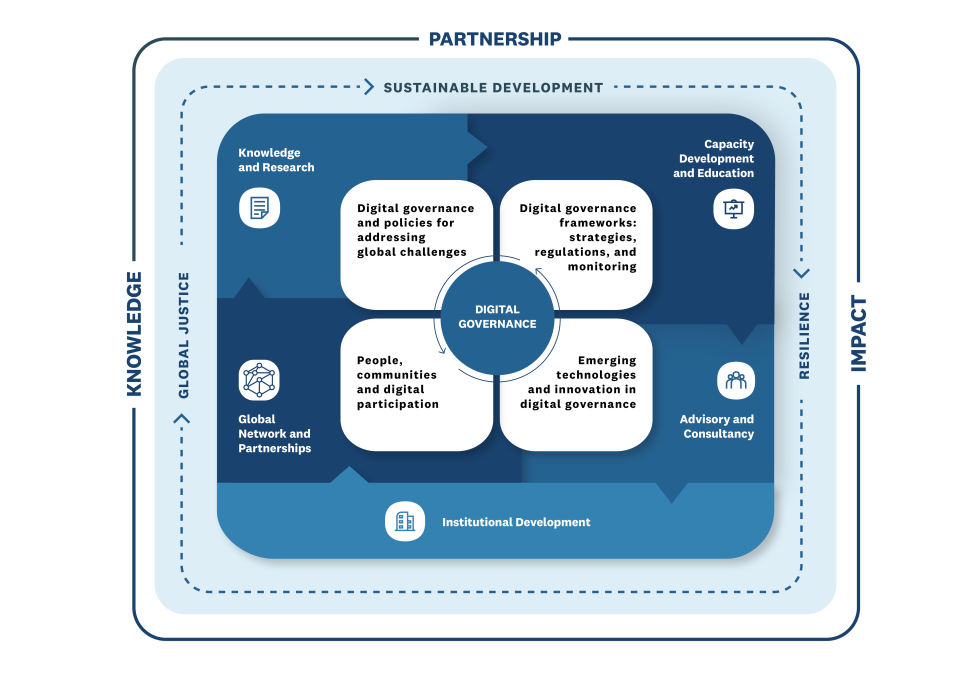The United Nations University Operating Unit on Policy-driven Electronic Governance (UNU-EGOV) advances digital governance globally by combining research with actionable policy advice, capacity development, and international cooperation.
Our work contributes to building inclusive, transparent, and sustainable digital societies, in alignment with the United Nations Sustainable Development Goals (SDGs) and the principles of the Global Digital Compact.
In a rapidly changing world, digital governance is evolving at an unprecedented pace, driven by advances such as Artificial Intelligence and other emerging technologies. While these innovations are reshaping the relationship between governments and citizens, enabling new forms of service delivery, they also reveal enduring challenges related to resilience, inclusivity, and justice.
Digital transformation remains uneven worldwide, with outdated infrastructure, skills gaps, and limited resources particularly affecting developing regions such as Africa and small island states. Addressing these disparities, alongside growing concerns around cybersecurity, data protection, and participation, is crucial for building just and sustainable digital futures.
Designed to respond to these realities and advance our vision of becoming a global leader in digital governance, particularly in addressing the challenges faced by the Global South, the UNU-EGOV Strategy 2025–2029 structured our work around four interconnected research thematic areas.
Research Thematic Areas

Core Activities
- Knowledge and Research: Driving high-quality, policy-relevant research that shapes digital governance theory and practice. By prioritizing impactful projects and fostering interdisciplinary collaboration, UNU-EGOV aims to expand the global knowledge base in digital governance.
- Capacity Development and Education: Enhancing skills and competencies in digital governance, with a focus on the Global South. Includes training programs, academic courses, and workshops designed to empower public officials and institutions.
- Global Networks and Partnerships: Strengthening collaboration with governments, international organizations, academia, and civil society to foster knowledge exchange and cooperative solutions for digital governance challenges.
- Advisory and Consultancy: Translating research into actionable policy recommendations and solutions. UNU-EGOV’s expertise bridges the gap between academic research and practical governance improvements.
- Institutional Development: Reinforcing UNU-EGOV’s capacity and sustainability by enhancing its institutional standing, governance structures, funding models, and human resources.
Guiding Principles and Values
UNU-EGOV operates with core values of integrity, respect for diversity, accessibility, collaboration, innovation, academic rigour, and professionalism. Its guiding principles emphasize citizen empowerment, inclusion, and evidence-based policymaking, ensuring that digital governance solutions enhance human rights, participation, transparency, and resilience.
By fostering global collaboration and adaptive governance, UNU-EGOV promotes sustainability, well-being, and peace, leveraging technology to build effective, safe, secure, and future-ready governance frameworks that benefit all segments of society.
Within the 2025–2029 programme cycle, UNU-EGOV will direct its core activities on contributing to global justice, sustainability, and resilience, while remaining grounded in its overarching guiding principles and values.
Impact and Global Reach
UNU-EGOV contributes to the digital transformation of governance worldwide, with a strong emphasis on the Global South. Through research, partnerships, and advisory work, UNU-EGOV has engaged with governments and organizations across multiple regions, delivered capacity development initiatives, and supported evidence-based policies that improve lives.

